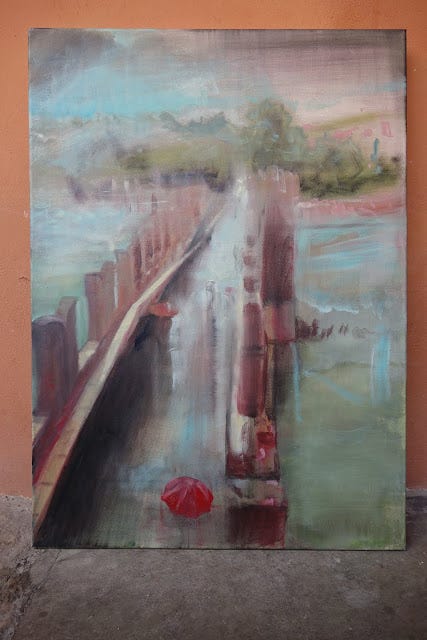First Dream, First Sale 2023
by Gregg Chadwick
Gregg Chadwick
Ponte del Castelvecchio (Verona)
48"x36"oil on linen
In Japan the first dreams of the New Year, hatsu-yume 初夢, traditionally provide markers for the dreamer's upcoming year. In that spirit, perhaps the first artwork sold in a new year provides inspiration for the months to come. My painting Ponte del Castelvecchio (Verona) is the first sale of 2023. On this first day of the new year, I am busy packing up my Verona painting for shipment to its new home.
I think back to the genesis of the painting. I was perched above a Renaissance era bridge in Verona watching a light rainfall and the swollen river rushing by. The smell of rain filled the air. Swifts darted across the milky sky. Like gauze stretched across a stage set, the mix of rain, bus exhaust, and a distant sun breaking through the mist cloaked the moment in a spell of timelessness. I thought of the late Russian emigre writer Joseph Brodsky and his idea that water is the image of time. Often on trips to Europe, I will carry a battered copy of Brodsky’s verse to help inspire my ramblings. Here in the Veneto, I am reminded of Brodsky’s love of Italy and Venice in particular. I turn the pages of Brodsky’s Watermark and find the passage I am looking for:
“I always adhered to the idea that God is time, or at least that His spirit is. Perhaps this idea was even of my own manufacture, but now I don’t remember. In any case, I always thought that if the Spirit of God moved upon the face of the water, the water was bound to reflect it. Hence my sentiment for water, for its folds, wrinkles, and ripples, and — as I am a Northerner — for its grayness. I simply think that water is the image of time, and every New Year’s Eve, in somewhat pagan fashion, I try to find myself near water, preferably near a sea or an ocean, to watch the emergence of a new helping, a new cupful of time from it. I am not looking for a naked maiden riding on a shell; I am looking for either a cloud or the crest of a wave hitting the shore at midnight. That, to me, is time coming out of water, and I stare at the lace-like pattern it puts on the shore, not with a gypsy-like knowing, but with tenderness and with gratitude.”
I look up from by book and peer down at the river’s edge. In the reeds and shallows small fish chasing food dart where the current eddies. In this reverie, my mind creates stories — If Brodsky is right these pools hold time in stasis. If I had a long net, maybe I could dip into the water and pull out living memories.
I rush back to my studio on Via Filippini and lay in with liquid oil paints the initial layers of my first study for Ponte di Castelvecchio.

On the canvas, I brush in greens, milky blues, and brick reds. The structure of the bridge begins to emerge as I cut into the wet paint with a loaded brush of lighter color. It is a large canvas in my small 16th-century space and it quickly becomes a presence in the room. After the initial surface is complete, I lean the wet painting against the plaster wall.

Gregg Chadwick’s Via Filippini Studio, Verona, Italy
I stand across the room and gaze at the painting. Even at this stage, the artwork has taken on a life of its own and I need to respect that. I see hints of Corot, maybe Degas? Perhaps I was thinking of Giorgione’s The Tempest now housed at the Gallerie dell’Accademia in Venice, Italy?

Giorgione Banner with Detail of The Tempest
I spend time with the painting, then out into the vibrant Veronese streets for dinner. Tomorrow, I will look at the painting again and maybe, if the paint is dry enough in the humid summer air, add more layers of color. In the morning light with an espresso in hand, I will see more clearly.
A few weeks later upon its completion, I left the study with a new collector in Verona and started on a much larger final version in my Santa Monica studio upon my return from Italy.
As a painting progresses, I will often find hints of its future shape in historical artworks as mentioned above, or in films, or books. When I was in graduate school at NYU, I studied not far from Verona in Venice. I often think of my instructor Giovanni Soccol who provided the art direction for Nicolas Roeg’s eerie Venice-based film Don’t Look Now. The film is based on a story by Daphne Du Maurier and stars Julie Christie and Donald Sutherland. Soccol’s artistic vision is evident throughout the film and I remember traveling to sites in Venice with Giovanni where the film was shot. As a Venetian, water is an important subject for Soccol and is often poetically referenced in his film work and his paintings.
Another striking element from Don’t Look Now has found an echo in my painting Ponte di Castelvecchio (Verona). The color red is a character in Don’t Look Now as much as Christie and Sutherland. That pop of color against the green-blue water, blue and grey skies, and tawny stone of Venice finds an echo in my painting. In my painting, the splashes of red and orange that mark the umbrellas swiftly carried across the bridge find their antecedent in Soccol and Roeg’s film. Water and time.
%20%2048%E2%80%9Dx36%E2%80%9D%20oil%20on%20linen%202016.jpg)



Comments